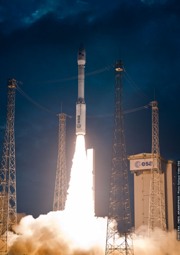21 March 2012
 University of South Australia experts will be making their contribution to keeping the International Space Station (ISS) ticking over as part of an international network of tracking stations monitoring the path of the latest European Space Agency (ESA) rocket launch on behalf of the French Space Agency, Centre National d’Etudes Spatiales (CNES), and Arianespace.
University of South Australia experts will be making their contribution to keeping the International Space Station (ISS) ticking over as part of an international network of tracking stations monitoring the path of the latest European Space Agency (ESA) rocket launch on behalf of the French Space Agency, Centre National d’Etudes Spatiales (CNES), and Arianespace.
UniSA’s Institute for Telecommunications Research (ITR) will be monitoring an Ariane 5 rocket to be launched this Friday (March 23) from French Guiana. The rocket will be carrying the ATV (Automated Transfer Vehicle) Eduardo Amaldi, headed for the International Space Station (ISS).
The mission is set to deliver vital supplies and hardware including refuelling propellants, water, oxygen, food, flight crew equipment, and research equipment (typically, for use in microgravity and biolife experiments).
The ATV will carry 2201 kg of dry cargo, the largest load of dry cargo to the ISS than any previous ATV mission. Among the more notable items flying inside the ATV is the Fluids Control Pump Assembly (FCPA), used to recycle urine into drinkable water aboard the ISS.
The ATV will also boost the ISS’s orbit to overcome the effects of atmospheric drag and will take away ISS waste.
ITR Director, Professor Alex Grant said UniSA’s is one of only six stations worldwide tracking the rocket’s progress.
“ITR will be recording data such as speed, location and status, being sent from the Ariane rocket as it travels through the Earth’s atmosphere at 28,000km per hour,” Prof Grant said.
“This information is invaluable to Arianespace because it allows them to analyse if the rocket’s systems are performing as they should.”
The Ariane 5 upper stage will pass over Adelaide twice in less than a two-hour period, with its transfer vehicle being released by the Ariane 5 rocket to transfer to the ISS just after the first pass. The ITR’s tracking dish at Mawson Lakes will be the only ground station to record an important rocket boost stage in the eastern sky of Adelaide. The passes are expected to take place between 1500 and 1800 Adelaide time.
Prof Grant said the team at ITR were now “old hands” in tracking for the project.
“This will be the third in the series of launches over the last four years that our experts have supported,” he said.
“ITR’s role is essential as part of the global network of tracking stations providing critical real-time data to the French Space Agency, CNES, for this mission. We’re always excited to be a part of that network and to make an important contribution to space endeavour.”
For more information about the Ariane/ATV launch, visit the European Space Agency, Centre National d’Etudes Spatiales, and ATV blog websites.
Media contact
- Michèle Nardelli office (08) 8302 0966 mobile 0418 823 673 email michele.nardelli@unisa.edu.au




